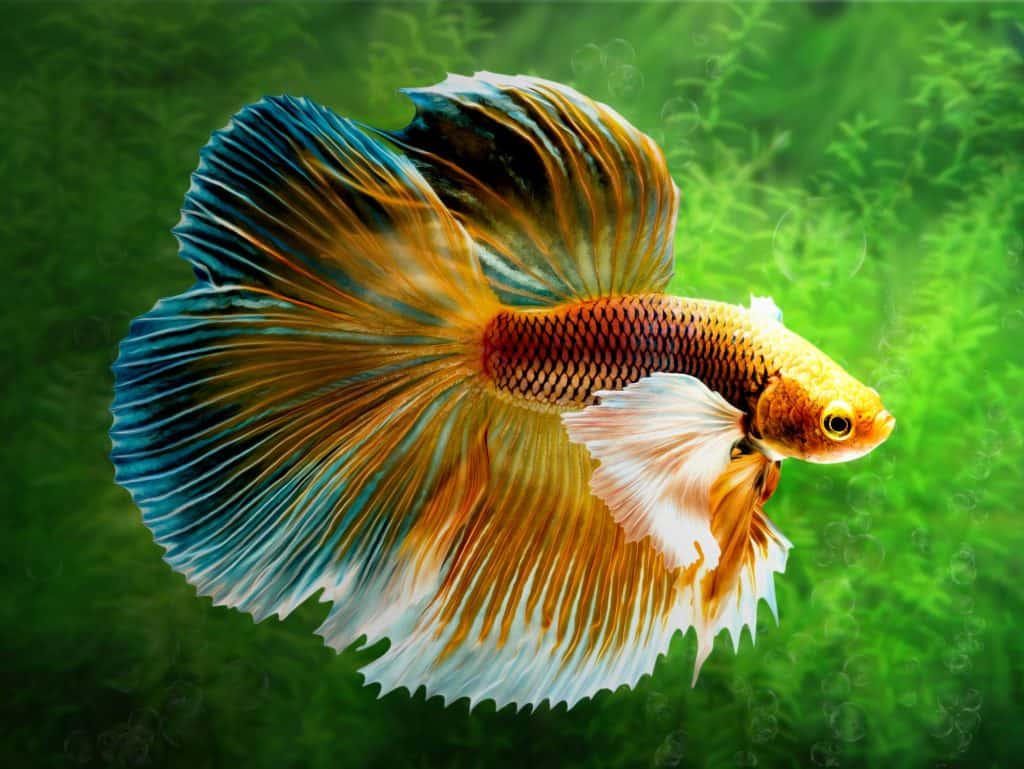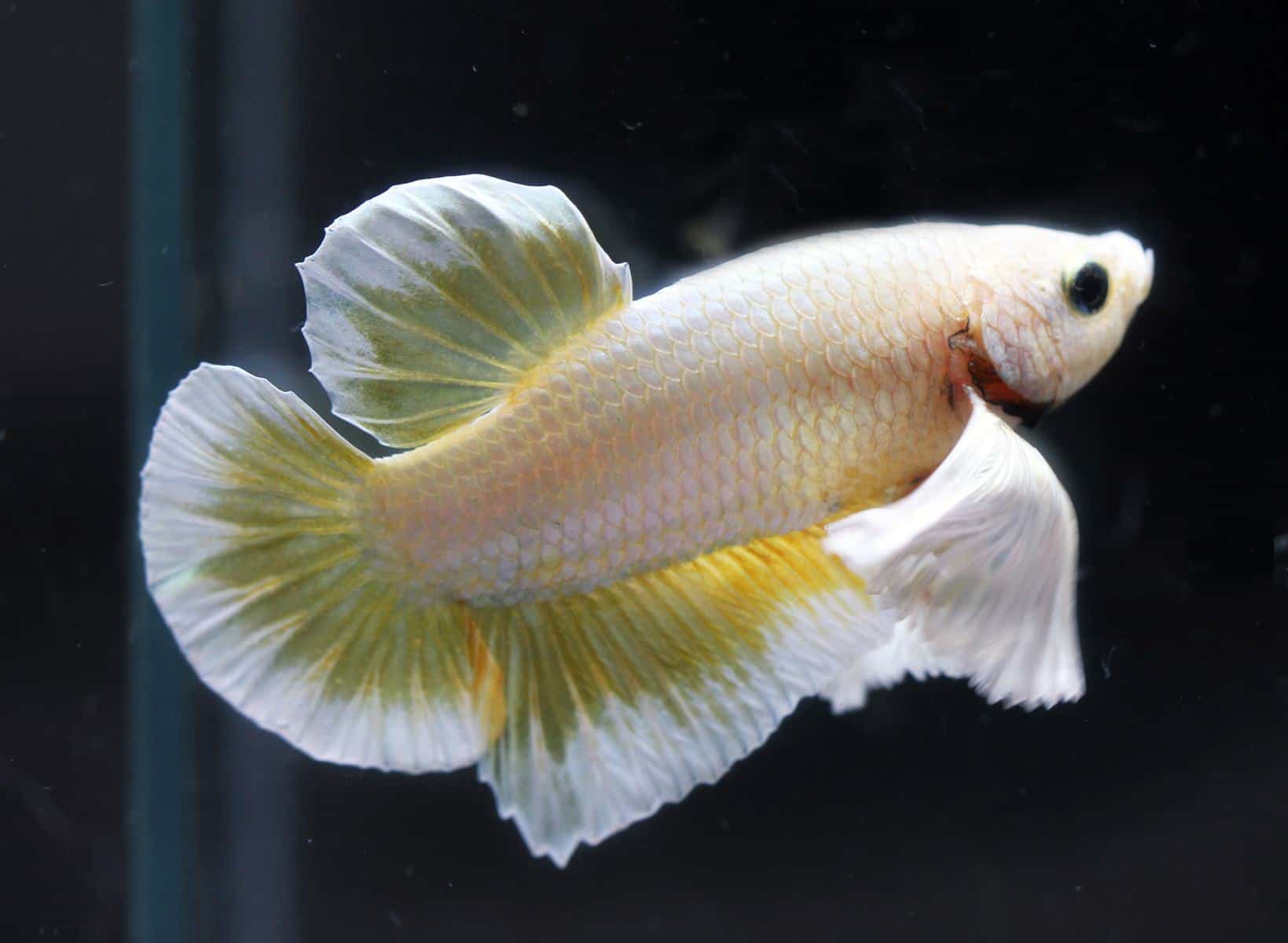Betta fish are undoubtedly beautiful creatures, and having the correct light in your betta fish tanks can be just what you need to bring out your pet’s colors and highlight its flowing fins.
But do betta fish really need light, and if so, should you leave the light on in the betta tank 24/7? Do they prefer natural or artificial light?
Read on to learn everything you need to know about betta fish and their aquarium lighting needs!
How Much Light or Darkness Does Your Betta Need?
For any fish species to thrive in captivity, you should aim to provide an environment that’s as close to the fish’s natural habitat as possible.
Although the betta fish you buy from your local fish store or online breeders aren’t varieties you’ll find in the wild, their origins will determine the conditions that best suit them. After all, even the fanciest betta splendens is still a wild plakat at heart!
The Betta Fish’s Natural Habitat
Wild betta fish are native to Thailand, specifically the Chao Phraya and Mekong River basins, where the fish live in shallow bodies of water, like rice paddies, marshes, ponds, and floodplains.
When the water levels fall during the annual dry season, bettas survive in small puddles, eating insects and their larvae that settle on the water’s surface.
The wild betta lives in a naturally dimly-lit environment, partly because the areas are heavily vegetated but also because the waters are stagnant and muddy.
Natural Light
That said, betta fish need to get to the water surface frequently, primarily to feed but also to breathe air using their labyrinth organ.
So, wild bettas generally hang out in the upper part of the water column, where the light is relatively bright thanks to sunlight. Bettas are most active during the day when they hunt by sight. After the sun sets, the fish go to sleep.
Lighting in the Aquarium Environment
In a home aquarium environment, bettas live in a brightly-lit habitat. That suits you, as you can easily see your gorgeous pet. It’s good for your betta, too, because it can see the food you give it.
Provided you decorate your fish tank with plenty of dense plants, caves, and hollow logs, there are plenty of opportunities for your betta to find shade if it wants to.
Do Betta Fish Need Light at Night?
Betta fish need to sleep at night, so the tank lighting should be turned off overnight to provide the same natural day and night cycle of the betta’s wild home.
Simply turn the lighting unit on in the morning when you get up to feed your betta and turn the lights out at night before you go to bed. Eight to 10 hours of light is plenty for your fish and adequate for your live plants.
Is Too Much Light Harmful to Your Betta?
Now you know how long you can leave your betta tank lights on daily and enjoy your beautiful betta and the aqua-scaping you did to create a perfect environment for it. However, note that too much artificial light can harm your betta fish.
Overstimulation
Bettas generally nap for short spells during the daytime; that’s just a betta thing, and it’s perfectly normal behavior.
However, if the tank lights are left on too long, the betta is likely to become overstimulated, which means it will be active for longer than normal.
Overstimulation can be stressful for your pet, which weakens the betta’s immune system, leaving the fish more vulnerable to attack by parasites and bacteria.
Appetite-Suppressant
Bettas are notoriously fussy feeders, and the stress of too much light in the tank can cause your betta fish to stop eating.
Bettas are programmed by nature to hunt and eat during the day and sleep when it’s dark. If you leave the aquarium lights on for too long, your betta’s body will become completely confused, so much so that it refuses food altogether.
What About Too Little Light?
As previously mentioned, your betta needs light to differentiate between day and night. If you don’t provide enough light, the fish won’t know when to eat or sleep. Poor lighting is also known to cause betta fish’s bright colors to fade.
Finally, if you want to introduce some female bettas to the tank with the intention of breeding, you should know that poor light conditions can inhibit spawning.
Do Bettas Prefer Artificial or Natural Light?
Your betta fish enjoys natural light in its natural environment, so is fitting an artificial light in its tank worth the effort?
If you keep your betta tank in a bright room with plenty of indirect natural light, you might not need to have a light in the tank.
However, bettas don’t really care whether the light in the tank is natural or artificial as long as they get the right amount of light.
Is Sunlight Good for Your Betta?
Although it’s fine to put your betta in a bright room sans artificial lighting, you don’t want to put the aquarium in direct sunlight. Why not? That’s a good question, to which there are a couple of answers:
Algae Bloom
Algae are tiny organisms that need sunlight to photosynthesize and spread. If you put your betta tank on a windowsill where it gets lots of direct sunlight, an algae bloom will most likely occur.
Algae quickly cover your tank’s viewing panes with a thick green slime, obscuring your view and ruining the look of your setup.
Algae grow on decorations, in-tank equipment, the substrate, and even coat your live plants, potentially stunting their growth.
Don’t worry- algae won’t harm your betta. In fact, they absorb harmful nitrates from the water, helping to keep the environment safe for your fish. Bettas will graze on algae, too.
However, an abundance of algae in your aquarium makes it look untidy and uncared for, so its growth isn’t something you want to encourage.
Temperature Shock
Betta fish are highly sensitive when it comes to water temperature changes, easily becoming shocked if the water in the aquarium is too cold or hot. Hot spots are also a hazard you don’t want in your betta tank.
If you place your betta’s tank somewhere that catches the sun, even if only for short periods of time, the water temperature can quickly shoot up, stressing your pet and potentially killing it.
That’s a big danger if you have a nano tank, which could easily heat right up to dangerous levels in just a matter of minutes.
How Many Watts Do You Need for the Size of Your Betta Tank?
Ideally, we recommend that you have 1 watt of light per gallon of water in your betta aquarium. You’ll need less than that for LEDs and a little more (at 1.5 watts per gallon) if you use fluorescent tubes.
What About Colored Lights?
Many LED aquarium lighting units come with a whole range of special effects and different-colored light bulbs, which you can use for some really cool aqua-scaping in your betta’s tank.
The good news is that colored lights are fine for bettas, provided you stick to your day and nighttime routine.
Reflections
As you know, the male betta is extremely territorial and won’t hesitate to attack another male that ventures into its space.
Your betta will most likely be stimulated into fight mode if it catches sight of its own reflection, mistaking its image for an intruder.
Now, a small amount of flaring and posturing presents some great photo opportunities for you and can benefit your betta for several reasons.
However, too much of that behavior can be very stressful for your pet.
Sometimes, tank lighting can cause reflections within the aquarium. Here’s how to keep mirror effects to a minimum:
- Reflections mostly happen when the tank is lit from the inside, and all the exterior lighting is off. So, you should only have your betta tank light on when the lights in the room are on, too.
- Cover the outside of the tank glass with aquarium paper to stop light reflections inside the habitat.
- Use dense planting around the perimeter of the tank to mask reflections.
Can Betta Fish See in the Dark?
The wild betta’s habitat is dark, murky, and thick with vegetation. Given that environment, it would make sense for bettas to be able to see in the dark.
So…can they? Well, before we answer that, let’s tell you more about how your betta’s eyesight works.
Color Vision
Bettas can see in color, more or less like people do, with a few possible variations in shades and hues.
Also, some fish cannot see red light, which technically makes those bettas colorblind.
How Do Betta Fish’s Eyes Work?
Not only do bettas have similar color perceptions as humans, but their eyes are also similar in how they work.
Bettas can focus on an object fairly precisely. However, the fish sees a contrasted, blurry image, whereas you see a sharper picture. That visual quirk enables the fish to view the object very effectively through a high-contrast image.
Dazzled
When presented with a bright light, your iris quickly contracts so you don’t get dazzled, which is something your betta’s eyes can’t do.
In fact, it takes anywhere from 30 to 60 minutes for your betta buddy’s iris to adjust to very bright or dim light.
Therefore, you should always switch on your main room lights before you turn on the aquarium lights. If you suddenly take your fish’s tank from total darkness to bright light, you could stress your pet and possibly damage its eyes.
Monocular Vision
Betta fish have what is called monocular vision. That means both your betta’s eyes see a different image.
People, on the other hand, have binocular vision, which means we can use both of our eyes to focus on one object.
In nature, animals with binocular vision are usually predators and have eyes that face forward.
In contrast, creatures with monocular vision are typically prey species with eyes that are positioned on the sides of their heads.
Betta fish are naturally predatory, hunting insects that settle on the water’s surface. However, bettas are prey, too, for larger fish species and birds.
So, while the betta uses its monocular vision to look out for predators, its ability to focus on a single thing also allows it to hunt effectively.
Night Vision
Let’s circle back to our original question — can bettas see in the dark? The answer is no, they can’t.
But don’t worry. Your betta buddy is in no danger of crashing into tank decorations at night; rather, it has another way of finding its way around once darkness falls.
The Lateral Line
Take a close look at your betta fish, and you’ll see a line of tiny holes running along its sides. Those holes are called the lateral line.
The lateral line senses vibrations, movement, and pressure changes in the fish’s immediate environment.
Your betta uses that information to determine how large or small a nearby object is and whether or not it moves.
The fish’s brain then uses that information to decide whether the object is a potential predator or merely an obstruction in the water.
Although your betta can’t see in the dark — at least not in the literal sense of the word — it can use its lateral line to find its way around and escape predators.
Can Betta Fish See Their Food in Complete Darkness?
Betta fish are not able to see their food in complete darkness. However, if there is a very small amount of light, they might be able to make out shapes, but this hasn’t been proven definitively.
In fact, betta fish have such poor vision compared to other animals, especially at night, that some researchers believe they might be colorblind.
In addition, while they have pressure sensors to keep them from swimming into anything, it is doubtful that these sensors can detect tiny pieces of fish food.
So, I don’t recommend leaving them in complete darkness for extended periods of time. If you must, ensure there is at least some small light source for them to see their food.
Are Betta Fish Afraid of the Dark?
Betta fish aren’t afraid of the dark, but they may be startled by sudden changes in light. For example, if you turn the lights off in a room where betta fish are kept, they may become disoriented and have trouble finding their way around.
Also, it’s worth noting that betta fish are susceptible to light and noise. So, if you are keeping them in a tank with other fish, make sure the tank is in a quiet, dimly-lit area of your home.
Can Bettas Enjoy Blue Light at Nighttime?
Betta fish don’t enjoy any kind of light when the night comes. At night, they become less active and prefer to stay in darker areas of their tank to rest their bodies.
In general, it is best to avoid any bright lights at night, as this can disturb your betta’s sleep cycle and make them more prone to stress.
Are LED Lights Suitable for My Bettas?
LED lights are the best option for your betta! Not only do they provide a soft light that won’t bother your fish, but they also don’t give off much heat. This means you won’t have to worry about the water becoming too hot or evaporating too quickly.
These lights are an inexpensive alternative to fluorescent bulbs or incandescent bulbs since they use less electricity. Therefore, they would be beneficial to the environment and your budget!
Also, you may even use colored bulbs in hues such as blue, yellow, or green to make your tank look more attractive without disturbing your betta’s natural coloration.
Is UV Light Good for My Bettas?
UV light is perfect for betta fish because it can help them adjust to a 24-hour day. Additionally, it can help promote plant growth in your tank, providing your betta with hiding places and oxygen.
However, too much UV light can lead to algae growth, so be sure to keep an eye on your tank and adjust the light accordingly.
What Is the Best Lighting for Fish?
To wrap things up, we can say the best lighting for betta fish is that which replicates the lighting in their natural environments.
Fairly subdued lighting or light diffused by a floating plant or two is perfect for your pet. Just remember to provide plenty of caves, overhangs, bushy plants, or floating hollow logs so your fishy friend can escape the light if it prefers.
Although bettas can’t see in the dark, they don’t need lighting in their tanks at night. These remarkable fish can find their way around a dark tank at night by using their lateral lines as a sixth sense.
And finally, replicate the day and night cycles by giving your betta eight to 10 hours of light followed by darkness overnight so your fish can sleep!













Hi –
Is there a maximum wattage betta can handle before they get stressed? I’m in the process of upgrading to 10 ten gallon planted tank from a two gallon planted heated drum bowl. My fish has been acting weird lately. I checked all parameters everything’s good, water is 80 degrees. Specifically the fish randomly (after two months) chose a new spot for hang out accept he looks like he’s hiding which he never does. He has plants and a betta log which he normally uses, and his hammock.
He appears to be hiding in a corner amongst a patch of dwarf sagittaria. He’s never done that before. I know fish hiding in the “weeds is a sign of stress, and I went down the list of possibilities 20 times.
Finally I just turned off the light as a test and on day two of just ambient room light he created a HUGE bubble next bigger than I’ve ever seen. He seems to be out and about like he used to be. He seems less stressed and he’s pretty much staying out of the weeds.
The light was an LED desk light and I don’t know the wattage on the lowest setting but I’m guessing it is 60 watts? It wasn’t directly over the drumbowl it was off to the side a bit just enough to provide light to the plants especially the floating anacharis. The floating plants provide cover and create a dappling effect and my fish hadn’t shown signs of stress at all until recently. However I realized yesterday he hadn’t built a bubble nest in a long time, and yesterday’s next is gigantic.
He’ll be getting a regular aquarium light in his new tank (it’s cycling now) but I’m wondering if the gooseneck regular light was causing stress and why did it take a couple of months before he picked a spot to start wedging himself in?
Again there’s nothing wrong with the fish or the water I triple checked everything and the fish never stopped eating or swimming around enthusiastically when he spots me near the tank. So it must be the light was too bright, right? Funny thing is it never seemed to bother him until about 12 days ago, so I’m wondering what is the best wattage for Betta fish? And what’s too intense?
Sorry for the long post and thank you much in advance!